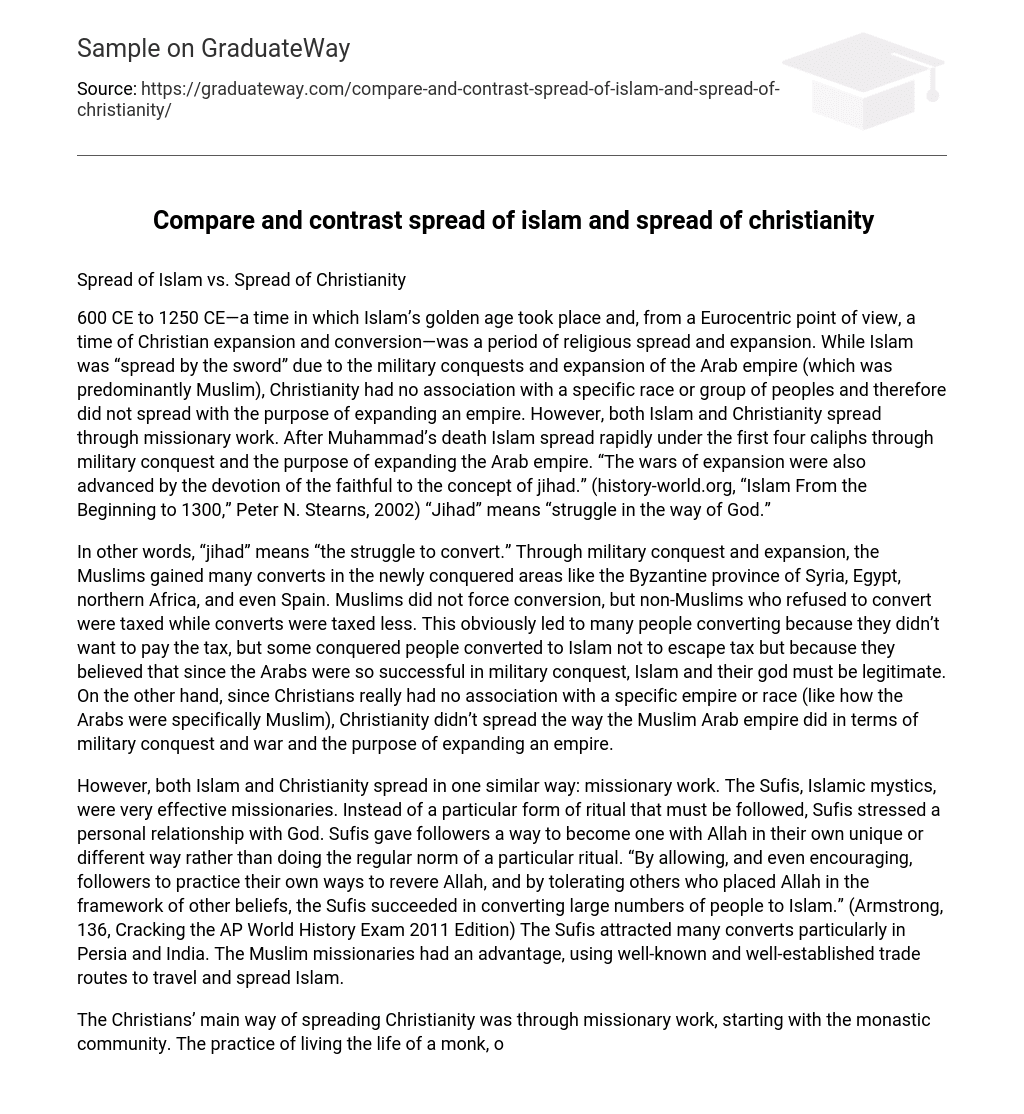Spread of Islam vs. Spread of Christianity
600 CE to 1250 CE—a time in which Islam’s golden age took place and, from a Eurocentric point of view, a time of Christian expansion and conversion—was a period of religious spread and expansion. While Islam was “spread by the sword” due to the military conquests and expansion of the Arab empire (which was predominantly Muslim), Christianity had no association with a specific race or group of peoples and therefore did not spread with the purpose of expanding an empire. However, both Islam and Christianity spread through missionary work. After Muhammad’s death Islam spread rapidly under the first four caliphs through military conquest and the purpose of expanding the Arab empire. “The wars of expansion were also advanced by the devotion of the faithful to the concept of jihad.” (history-world.org, “Islam From the Beginning to 1300,” Peter N. Stearns, 2002) “Jihad” means “struggle in the way of God.”
In other words, “jihad” means “the struggle to convert.” Through military conquest and expansion, the Muslims gained many converts in the newly conquered areas like the Byzantine province of Syria, Egypt, northern Africa, and even Spain. Muslims did not force conversion, but non-Muslims who refused to convert were taxed while converts were taxed less. This obviously led to many people converting because they didn’t want to pay the tax, but some conquered people converted to Islam not to escape tax but because they believed that since the Arabs were so successful in military conquest, Islam and their god must be legitimate. On the other hand, since Christians really had no association with a specific empire or race (like how the Arabs were specifically Muslim), Christianity didn’t spread the way the Muslim Arab empire did in terms of military conquest and war and the purpose of expanding an empire.
However, both Islam and Christianity spread in one similar way: missionary work. The Sufis, Islamic mystics, were very effective missionaries. Instead of a particular form of ritual that must be followed, Sufis stressed a personal relationship with God. Sufis gave followers a way to become one with Allah in their own unique or different way rather than doing the regular norm of a particular ritual. “By allowing, and even encouraging, followers to practice their own ways to revere Allah, and by tolerating others who placed Allah in the framework of other beliefs, the Sufis succeeded in converting large numbers of people to Islam.” (Armstrong, 136, Cracking the AP World History Exam 2011 Edition) The Sufis attracted many converts particularly in Persia and India. The Muslim missionaries had an advantage, using well-known and well-established trade routes to travel and spread Islam.
The Christians’ main way of spreading Christianity was through missionary work, starting with the monastic community. The practice of living the life of a monk, or a nun in some cases, is known as monasticism. Monks and nuns worked to spread Christianity to all of Europe. “English and Irish monks were very enthusiastic missionaries—people sent out to carry a religious message—who undertook the conversion of non-Christian peoples, especially in German lands.” (Spielvogel, 306, Glencoe World History) The missionaries provided a moral example to all converts and brought a message about Heaven, Hell, and the teachings of Christ to western Europe, especially Germany and the Netherlands. By 1050 most of western Europe had become Catholicized.
For the Arabs expansion of their empire and their effort to convert others to Islam came hand in hand while Christianity had no restriction to a certain nationality or empire, so Christianity did not spread like the “war and conquest” way of the Arab Muslims. The Arabs’ success in winning wars was used as an advantage to not only expand the empire but spread the Arab religion of Islam. However, both Islam and Christianity spread through the travels of missionaries. Islam, spreading through the missionary help of the Sufis, and Christianity, spreading through the missionary help of the monastic community, both have a long-lasting impact on today’s world and history.
Work Cited
“The Spread of Christianity in Europe.” The Spread of Christianity in Europe. N.p., n.d. Web. 04 Nov. 012. . Stearns, Peter N. “Islam From the Beginning to 1300.” Islam, The Spread Of Islam. N.p., 1992. Web. 04 Nov. 2012. . Spielvogel, Jackson J., P.H.D. Glencoe World History. N.p.: McGraw-Hill Companies, 2008. Print. Armstrong, Monty. Cracking the AP World History Exam 2011 Edition. New York: Princeton Review, 2010. Print.





